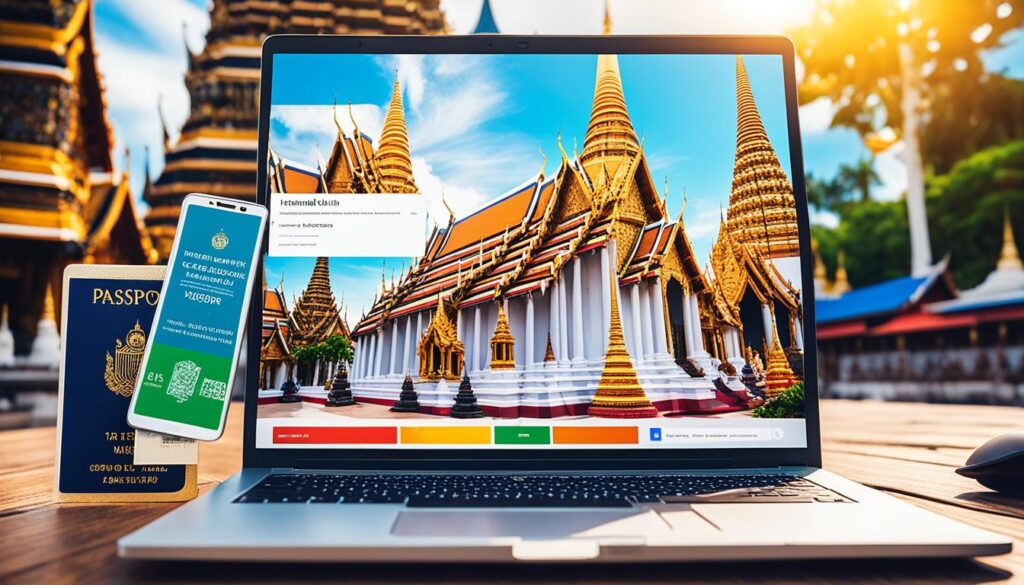Are you a digital nomad dreaming of working and living in the tropical paradise of Thailand? The good news is, it’s possible! But before you pack your bags and hop on a plane, there are important visa requirements you need to know. Navigating the visa process can be confusing, especially with the various options available. This comprehensive guide will walk you through the different visa requirements for digital nomads in Thailand, empowering you to make informed decisions for your digital nomad lifestyle.
From understanding the Thai work permit process to exploring long-term stay options and current tourist visa strategies, this guide has all the information you need to know to make your digital nomad dreams in Thailand a reality.

Table of Contents
Key Takeaways:
- Understand the criteria for work permit consideration in Thailand.
- Dispelling the myth of a specific digital nomad visa in Thailand.
- Explore long-term stay options for digital nomads.
- Know the specific requirements for obtaining a digital nomad visa in Thailand.
- Learn about current tourist visa strategies for digital nomads.
Understanding the Thai Work Permit for Digital Nomads
Before diving into visa requirements, it’s important to understand the Thai work permit process for digital nomads. This section will outline the criteria that the Work Permit Office considers when determining whether a foreigner is working in Thailand, as well as provide examples of typical digital nomad activities that may or may not require a work permit. Understanding these factors will help you determine if you need a work permit to legally work as a digital nomad in Thailand.
Criteria for Work Permit Consideration
The Work Permit Office in Thailand carefully evaluates several criteria when determining the need for a work permit. It’s essential to fulfill these requirements to comply with Thai law and avoid any legal complications. The factors considered for work permit consideration include:
- Duration of work in Thailand
- Nature of work activities
- Source of remuneration
- Work location
Meeting these criteria is crucial, as failure to do so can result in fines, visa cancellation, or even deportation. Make sure to thoroughly understand the guidelines and consult with legal professionals or local authorities if you have any doubts or questions about your specific situation.
Typical Cases of Digital Nomad Activities in Thailand
While digital nomad activities vary widely, some common scenarios can help you determine if you require a work permit in Thailand. Here are a few examples:
- Working for a foreign employer while physically present in Thailand: If you are employed by a company based in another country but perform your duties while in Thailand, you may be considered as working in Thailand and require a work permit.
- Freelancing or offering services remotely: If you provide services as a freelancer or independent contractor, even if the clients are based abroad, and you are physically present in Thailand, you need to comply with work permit requirements.
- Employing Thai citizens or engaging in business activities: If you are operating a business in Thailand that involves employing Thai citizens or engaging in activities that generate income within the country, you will need a work permit.
These examples highlight the importance of understanding the nature of your work as a digital nomad in Thailand. It’s crucial to ensure compliance with the Thai work permit regulations to avoid any legal issues that may hinder your stay in the country.
Dispelling the Myth: Thailand Digital Nomad Visa Availability
Despite the popularity of Thailand as a digital nomad destination, there is a common misconception that there is a specific digital nomad visa available. In this section, we will debunk this myth and discuss the actual visa options that are available for digital nomads in Thailand. By clarifying this information, you can make informed decisions about your visa strategy and understand the limitations of visa options for digital nomads in Thailand.

The idea of a dedicated digital nomad visa in Thailand may sound appealing, but the reality is different. Thailand does not currently offer a specific visa solely for digital nomads. Instead, digital nomads have various visa options to choose from, depending on their circumstances and preferences.
The Thailand Tourist Visa is a popular choice for digital nomads. This visa allows for a stay of up to 60 days and can be extended for an additional 30 days at a Thai immigration office. However, it’s important to note that this visa does not allow for work or employment in Thailand.
Another option is the Thailand Elite Visa, which provides long-term stay privileges for a period of 5, 10, or 20 years. While this visa is not specifically designed for digital nomads, it offers longer stays and greater convenience for those looking to spend an extended period of time in Thailand. However, it does come with a significant price tag.
For digital nomads who want to work legally in Thailand, obtaining a work permit is essential. This typically requires sponsorship from a Thai company or employer. However, it’s worth noting that the work permit process can be complex and time-consuming.
It’s important to research and understand the visa options available to you as a digital nomad in Thailand. Each visa has its own requirements, limitations, and benefits. By exploring all the available options and seeking professional advice if needed, you can navigate the visa process and make the best decision for your digital nomad lifestyle in Thailand.
| Visa Option | Duration of Stay | Work Permitted |
|---|---|---|
| Thailand Tourist Visa | Up to 60 days (extendable for 30 days) | No |
| Thailand Elite Visa | 5, 10, or 20 years | No |
| Thai Work Permit | Depends on work contract | Yes |
Thailand Long-Term Stay Options for Digital Nomads
For digital nomads who wish to stay in Thailand for an extended period of time, there are long-term stay options available. This section will provide an overview of the Thai Long-Term Residency (LTR) Visa and explain the application process and requirements. Additionally, alternative long-stay visas for working remotely will also be discussed to provide digital nomads with multiple options for their long-term stay in Thailand.
Thai Long-Term Residency (LTR) Visa Explained
The Thai Long-Term Residency (LTR) Visa is a popular option for digital nomads who want to stay in Thailand for an extended period of time. This visa allows you to live and work in Thailand for up to one year, with the possibility of renewing the visa for subsequent years.
To be eligible for the Thai LTR Visa, you must meet certain requirements, including:
- Being employed or having a source of income outside of Thailand
- Having a clean criminal record
- Having a valid passport with at least six months validity
Once you meet the eligibility criteria, you can apply for the Thai LTR Visa at your nearest Thai embassy or consulate. The application process typically requires the submission of various documents, such as proof of income, a criminal background check, and a medical certificate.
It’s important to note that the Thai LTR Visa does not grant you the right to work in Thailand. If you wish to work in Thailand, you will still need to obtain a work permit.
Alternative Long-Stay Visas for Working Remotely
In addition to the Thai LTR Visa, there are alternative long-stay visas available for digital nomads who want to work remotely in Thailand.
One option is the Thai Elite Visa. This visa offers long-term stay options ranging from five to 20 years, with various benefits including visa extensions, airport services, and VIP treatments. However, the Thai Elite Visa comes with a significant price tag, with membership fees ranging from 500,000 to 2 million Thai Baht.
Another alternative is the Education Visa, which allows you to study in Thailand while also granting you the right to work. This visa requires enrollment in a certified educational institution in Thailand.
Lastly, digital nomads can also consider the Non-Immigrant B Visa, which is typically obtained for employment purposes but can be used for freelance work. This visa requires sponsorship from a Thai company or individual.
Each alternative long-stay visa has its own specific requirements and benefits. It’s important to research and carefully consider which option best suits your needs and goals as a digital nomad in Thailand.
Thailand Digital Nomad Visa Requirements
Are you dreaming of living and working as a digital nomad in Thailand? To make your dream a reality, it’s important to understand the specific requirements for obtaining a digital nomad visa in Thailand. This section will provide you with a step-by-step breakdown of what you need to know to successfully apply for a visa.
When applying for a digital nomad visa in Thailand, you’ll need to fulfill certain financial requirements. The Thai government wants to ensure that you can support yourself during your stay. You’ll need to provide proof of sufficient funds, such as bank statements or income statements.
In addition to financial requirements, you’ll also need to gather the necessary documentation. This includes a valid passport with at least six months of validity remaining, proof of accommodation in Thailand, and a detailed itinerary of your planned activities as a digital nomad.
It’s important to note that the specific requirements may vary depending on your nationality and the type of digital nomad visa you’re applying for. It’s essential to research and consult with the relevant Thai authorities or an immigration lawyer to ensure you have the most up-to-date and accurate information for your application.
“The Thailand Digital Nomad Visa Requirements Guide helped me understand the specific documents and financial requirements I needed to fulfill. It made the visa application process much smoother!” – Digital Nomad
By understanding and fulfilling the specific requirements for a digital nomad visa in Thailand, you can maximize your chances of a successful application. Ensure that you have all the necessary information and documentation to embark on your digital nomad journey in the Land of Smiles.
For more detailed information on Thailand digital nomad visa requirements, refer to the table below:
| Requirement | Details |
|---|---|
| Valid Passport | A passport with at least six months of validity remaining |
| Sufficient Funds | Proof of financial stability to support yourself during your stay |
| Proof of Accommodation | Evidence of a place to stay in Thailand during your digital nomad journey |
| Detailed Itinerary | A comprehensive plan outlining your activities as a digital nomad in Thailand |

With these requirements in mind, you’ll be better equipped to navigate the digital nomad visa application process in Thailand. Good luck in starting your new adventure in this beautiful country!
Current Tourist Visa Strategies for Digital Nomads
While there may not be a specific digital nomad visa, digital nomads can utilize various tourist visa strategies to stay and work in Thailand. This section will explore the different tourist visa options available, including the visa exemption scheme, Thai single entry tourist visa, and Thai multiple entry tourist visa. Additionally, information on extensions and how to maximize your stay as a digital nomad will be provided.
Tourist Visa Exemption Scheme
The visa exemption scheme allows citizens of certain countries to enter Thailand without a visa and stay for up to 45 days for tourism purposes. However, it’s important to note that this visa exemption does not permit employment or long-term work in Thailand. Digital nomads can take advantage of this option for short-term stays and explore the country while working remotely. To qualify, visitors must have a valid passport, a return ticket, and proof of sufficient funds for the duration of their stay.
Thai Single Entry and Multiple Entry Tourist Visas
In addition to the visa exemption scheme, digital nomads can also consider applying for a Thai single entry tourist visa or a Thai multiple entry tourist visa. The Thai single entry tourist visa allows for a stay of up to 60 days and can be extended once for an additional 30 days at a local immigration office in Thailand. This option is ideal for digital nomads who plan to stay for a longer period but need flexibility in their travel plans.
The Thai multiple entry tourist visa, on the other hand, allows for multiple entries into Thailand within a specified period. This visa is valid for 6 months or 1 year and allows for a stay of up to 60 days per entry. Digital nomads can exit and re-enter Thailand to maximize their stay without having to apply for a new visa each time. This option provides convenience and flexibility for those who frequently travel in and out of the country.
By utilizing these tourist visa strategies, digital nomads can enjoy the beauty and culture of Thailand while staying compliant with the country’s visa regulations. Whether they choose the visa exemption scheme, a Thai single entry tourist visa, or a Thai multiple entry tourist visa, it’s important for digital nomads to familiarize themselves with the specific requirements and limitations of each option.
| Visa Type | Maximum Stay | Extension Options |
|---|---|---|
| Visa Exemption Scheme | Up to 45 days | No extension permitted for work purposes |
| Thai Single Entry Tourist Visa | Up to 60 days | Extension of 30 days possible at local immigration office |
| Thai Multiple Entry Tourist Visa | Up to 60 days per entry | Exit and re-entry to extend stay |
Understanding these tourist visa options and their respective extension possibilities will help digital nomads plan their stay in Thailand more effectively. It’s essential to comply with the visa requirements and seek guidance from the Thai immigration authorities or a reliable visa service to ensure a smooth and legal stay as a digital nomad in Thailand.
How to Apply for a Thai Work Permit
For digital nomads who want to legally work in Thailand, obtaining a work permit is essential. This section will guide you through the step-by-step process of applying for a Thai work permit. By following these instructions and gathering the necessary documents, you’ll be well-prepared to navigate the application process with ease.
Step 1: Understand the Work Permit Requirements
Before you begin the application process, it’s crucial to familiarize yourself with the requirements for obtaining a work permit in Thailand. The Thai authorities require certain documents and qualifications, including:
- Proof of employment, such as an employment contract or letter of offer from a Thai employer
- Valid passport with at least six months of remaining validity
- Non-immigrant visa (such as a business visa) or a work visa
- Educational certificates and qualifications that are relevant to the job
- Medical certificate issued by a licensed physician
- Police clearance certificate from your home country
It’s important to note that the specific requirements may vary depending on the type of work you’ll be undertaking in Thailand. Therefore, it’s advisable to consult with an immigration lawyer or the Thai authorities to ensure you have all the necessary documents and meet the qualifications.
Step 2: Gather the Required Documents
Once you understand the work permit requirements, you’ll need to gather all the necessary documents. Make sure to have copies of each document prepared and organized for submission. This will help expedite the application process and avoid any delays.
Step 3: Submitting the Application
After you have gathered all the required documents, you can submit your work permit application. You can do this at the nearest Thai embassy or consulate in your home country, or in Thailand at the One-Stop Service Center for Visas and Work Permits.
Step 4: Application Processing and Approval
Once your application is submitted, it will be reviewed by the Thai authorities. They will assess your qualifications and verify the documents provided. Processing times can vary, but typically range from a few weeks to a few months.
Step 5: Work Permit Issuance
If your application is approved, you will be issued a work permit. This permit will allow you to legally work in Thailand for the specified period stated on the permit. It’s important to note that work permits need to be renewed annually.
Remember, the process of applying for a Thai work permit can be complex, and it’s always best to consult with a qualified immigration lawyer or seek advice from the Thai authorities to ensure a smooth and successful application.
Conclusion
As we wrap up this guide on digital nomad visa requirements in Thailand, it’s clear that navigating the visa options can be complex, but not impossible. By understanding the different visa options available, including the Thai Long-Term Residency (LTR) Visa and various tourist visa strategies, you have multiple paths to choose from for your digital nomad journey in Thailand.
Throughout this guide, we have highlighted the importance of understanding the Thai work permit process and when it is required for digital nomads. While there may not be a specific digital nomad visa, it’s essential to abide by the regulations to ensure a legal and hassle-free stay in Thailand.
By having a comprehensive understanding of the visa requirements, you will be empowered to make informed decisions about your digital nomad lifestyle in Thailand. Whether you choose to pursue a long-term stay option or utilize current tourist visa strategies, remember to stay updated on any changes in regulations and seek professional advice when needed.
FAQ
What are the criteria for work permit consideration in Thailand?
The criteria considered by the Work Permit Office include the nature of the work, duration of stay, and the intention to receive remuneration or profit while in Thailand.
What are some typical cases of digital nomad activities that may or may not require a work permit in Thailand?
Examples of activities that may require a work permit include providing services or consultancy to clients in Thailand, managing a Thai company remotely, and earning income from Thai sources. On the other hand, attending business meetings, conducting market research, or attending conferences without providing services generally do not require a work permit.
Are there specific digital nomad visas available in Thailand?
No, there is no specific digital nomad visa available in Thailand. Digital nomads should explore other visa options that are suitable for their situation, such as tourist visas or long-term residency visas.
What is the Thai Long-Term Residency (LTR) Visa?
The Thai Long-Term Residency (LTR) Visa is a long-term stay option for digital nomads who wish to stay in Thailand for an extended period. It allows multiple entries during its validity and is typically valid for one year.
Can digital nomads apply for alternative long-stay visas in Thailand?
Yes, digital nomads can apply for alternative long-stay visas in Thailand, such as the Non-Immigrant O Visa or Non-Immigrant B Visa. These visas require specific eligibility criteria and documentation.
What are the specific requirements for obtaining a digital nomad visa in Thailand?
The specific requirements may vary depending on the type of visa, but generally, applicants need to provide proof of financial stability, proof of accommodation, a valid passport, and relevant supporting documents for the chosen visa.
What tourist visa options are available for digital nomads in Thailand?
Digital nomads can utilize various tourist visa options in Thailand, including the visa exemption scheme, Thai single entry tourist visa, and Thai multiple entry tourist visa. Each option has its own validity period and requirements.
How can digital nomads apply for a Thai work permit?
To apply for a Thai work permit, digital nomads need to gather the necessary documents, such as a job offer or employment contract, educational certificates, and a health certificate. The application process involves submitting the documents to the Department of Employment and attending an interview.









